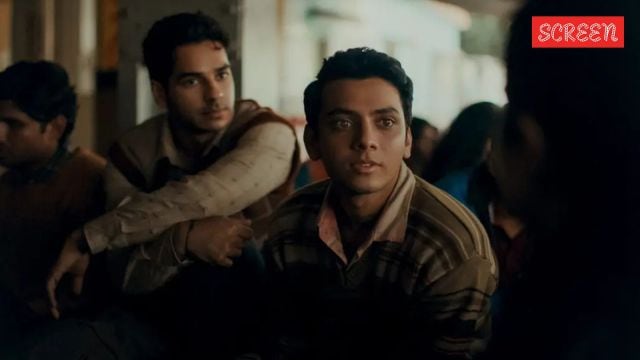Click here to follow Screen Digital on YouTube and stay updated with the latest from the world of cinema.
Neeraj Ghaywan’s sophomore feature Homebound uses belonging as a smokescreen to reveal how this is no country for the marginalized
The idea of home hangs heavy over Homebound, as Neeraj Ghaywan brushes up against the melodramatic sweep of Bimal Roy’s Do Bigha Zameen and evokes the moral solitude of Raj Kapoor’s Jagte Raho.
 Homebound tells the story of youth caught in a struggle with the nation that has shaped them, yet refuses to claim them.
Homebound tells the story of youth caught in a struggle with the nation that has shaped them, yet refuses to claim them.Around the 30-minute mark in 12th Fail, Vidhu Vinod Chopra crafts a montage: Manoj (Vikrant Massey) arrives for the first time in Delhi’s Mukherjee Nagar, and is stunned by the sheer mass of bodies. Young men and women, all burning with the same hunger, the same dream of clearing a government service exam. A similar moment opens Neeraj Ghaywan’s sophomore feature Homebound. Shoaib (Ishaan Khatter) and Chandan (Vishal Jethwa) step onto a railway platform and freeze seeing dozens of students sit along the tracks, backpacks at their feet, waiting for the train that will carry them to yet another exam centre. Another film, another city, another shot, but the same ache. A country in conflict with its youth. A country that records their presence but erases their possibilities. A country with no room for their dreams, and no will to wait for them. It instantly reminds you what Shashi Kapoor’s character once said in Yash Chopra’s Deewaar: “Yeh duniya ek third-class ka dabba ban gayi hai. Jagah bohot kam hai, aur musafir bohot zyada.” (The world has become a third-class compartment: too many passengers, too little room).
As Homebound unfolds, that line turns from metaphor into atmosphere. But it’s worth noting that beyond this point, 12th Fail and Homebound are largely antithetical to each other in many ways. Where Chopra’s film finds dignity in struggle, Ghaywan’s film dismantles the very myth of struggle as a ladder. If 12th Fail is about breaking through the crowd, Homebound stays in the crowd itself, questioning whether there’s even a door left to knock on. Perhaps that’s why, when Chandan and Shoaib finally manage to board the train, they tell each other that reaching the exam centre is a battle in itself. Perhaps that’s why their aspiration, to become police constables, carries a meaning altogether different from that of Manoj’s in 12th Fail. Manoj is moved by the idea that when honesty is married to power, it can move mountains. But Shoaib and Chandan are not chasing transformation. They are aiming for protection. What draws them to the uniform is not the idealism of justice, but the possibility of shielding themselves from a system that has humiliated them for generations. And perhaps that’s why, when they see a constable wielding physical authority on the railway platform, Shoaib turns to Chandan and says, “When you’re in uniform, your faith and caste no longer matter.” It’s not to be misunderstood as a declaration of equality, but instead as a survival strategy devised by both of them. Just as it’s not to be read as belief in the system, but as the desire to stop being its target.
That’s why it hits you when you realize Chandan is hiding his Dalit identity, because somewhere deep down, he knows that even if he ascends the social ladder, he will remain othered, perpetually subjected to caste-based humiliation. (There’s a very affecting scene early in the film where a clerk seeks to assert his dominance through a glance and body language meant simply to belittle Chandan.) Yet, Chandan also grasps that the government job represents his only viable escape. His parents labour at a construction site; his sister tends to children at a local school. Herein lies the fundamental divergence between 12th Fail and Homebound. 12th Fail focuses singularly on Manoj’s class struggle through a merciless world, seldom turning its gaze back towards the family he left behind, in that zero-sum landscape. He possesses the luxury of an unburdened forward movement, largely due to an inherent caste privilege. And when the narrative does look back, it exposes the fragility and devastation that have consumed their lives in his absence, yet these hardships ultimately serve to propel him forward. Homebound, by contrast, refuses to sever Chandan from his roots. It also does not operate in a vacuum, but unfolds at the dense crossroads where caste converges with class, and both are refracted through the lens of gender. In one of the best scenes of the film, his sister Vaishali (Harshika Parmar) confronts him with the reality of his privilege: his maleness afforded him the opportunity for education, a privilege denied to her. His ability to dream is not born of individual merit alone but rests upon the endless toil of those around him.
Also Read | The visual poetics of Sabar Bonda, caught between stillness and scrutiny, distance and closeness
Shoaib, however, carries the weight of inherited expectations. His journey mirrors Murad’s in Zoya Akhtar’s Gully Boy (Ranveer Singh): a young Muslim son whose dreams are tightly bound to the debts owed to family and circumstance. Like Murad’s father, Shoaib’s father (Pankaj Dubey) suffers from a knee injury; like Murad’s father, he too measures Shoaib’s worth as a cruel arithmetic in a time divided. And, like Murad’s father, he is similarly exasperated by Shoaib being fettered to a dream that seems to pull him away from the immediate duties that keep the household standing. But Ghaywan, ever sensitive to the multitudinous facets of his characters, he moves beyond cliche to subvert the traditional father figure. In one of the film’s most affecting moments, Shoaib’s father urges him not to abandon his aspirations on their behalf. The scene is charged with profound subtext: it is a benediction, a recognition from a man weathered by the world, who knows that in a land that withholds so much, the sole mercy he can grant his Muslim son is the right to dream in his home. Perhaps that’s why even Chandan’s mother (a superb Shalini Vatsa) gives him space to breathe and become, knowing that, at least inside her home, he is allowed to be himself, unbound and free.
After all, the idea of home hangs heavy over Homebound. Where Shoaib is asked, again and again, “where is your true home?” Chandan holds a dream, to build one, brick by brick, for those who have never had one. Where Shoaib is asked to flee his homeland, Chandan is never fully welcomed in it. No wonder, they both become wanderers in their own land. No wonder, they are called strangers on the soil that raised them. And, no wonder they often sit by flowing water, for like the streams, they too are summoned to move, again and again, never given the stillness that a home might offer. Water becomes Homebound’s most persistent visual motif, joined by trains, buses, pigeons, each a symbol of motion, of impermanence, of lives always in transit. At his best, Ghaywan brushes against the melodramatic sweep of Bimal Roy’s Do Bigha Zameen, and evokes the aching moral solitude of Raj Kapoor’s Jagte Raho. But at his greatest, he reminds you of the true auteur he is, in moments that devastate completely. A mother sits barefoot at the threshold of her home, waiting for her son to return with slippers. She waits. He is homebound. She keeps waiting. He never arrives. Because, in truth, he never had a home to return to.
- 01
- 02
- 03
- 04
- 05


































